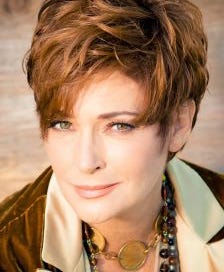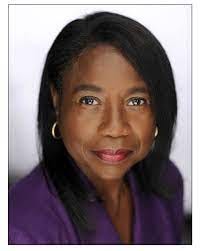L.A. Stage Insider
Celebrating the best in live theater andcabaret in the Greater Los Angeles Area
July 27, 2022
Written by Julio Martinez
LA. WOMENS THEATRE FESTIVAL…ODYSSEY THEATRE’S L.A. PREMIERE ADAPTATON OF HENRIK IBSEN’S ‘GHOSTS’…WORLD PREMIERE OF ‘THE SECRET WORLD OF ARCHY AND MEHITABLE’ AT WHITEFIRE…INSIDE L.A. STAGE HISTORY SPOTLIGHTS BEORGE BOROFF AND THE CIRCLE THEATRE
NEWS
Adilah Barnes
The 9th Annual Los Angeles Women’s Theatre Festival’s Solo Performer Empowerment Weekend will take place, Aug 12-14, presented virtually on Zoom. This weekend event features career training from industry professionals, designed to give a boost to solo performers; but will also be of value to anyone contemplating online or live theatrical production in Los Angeles and those who wish to tour in these changing times. Attendees will find 11 offerings including workshops and panels. Mentors include: LAWTFs Co-Founder, Adilah Barnes, Debra De Liso (director, instructor, actor), Jessica Lynn Johnson (CEO of Soaring Solo), Sharon Nyree Williams (producer, writer, poet), Lynne Conner (actor, filmmaker, publicist), John Freeland (production manager, technical director, and stage manager), Elizabeth Harper (lighting designer), Ben Guillory (Producing Artistic Director, The Robey Theatre Company), Kat Kramer (producer, writer, actor), Socks Whitmore (Stage Raw critic, writer, and actor), Bryan Rasmussen (Artistic Director, Whitefire Theatre), Phil Sokoloff (actor/publicist) and more. For registration and further information, go to: https://lawtf.org or call (818) 760-0408.
PREMIERES
Pamela J. Gray and Barry Del Sherman
Odyssey Theatre Ensemble is offering the L.A. premiere of “Ghosts,” an adaptation by British director Richard Eyre, of what may be Henrik Ibsen’s most controversial play. Director Bart DeLorenzo, explains, “By examining the issues of the day through the conflicts of one single family, he shows us how culture imposes its values on individuals and speaks through us, and how difficult change can be.” The cast includes Pamela J. Gray, Barry Del Sherman, Alex Barlas, Viva Hassis Gentes and J. Stephen Brantley. “Ghosts” opens Sep 10, continuing through Oct 23. The Odyssey Theatre is located at 2055 S. Sepulveda Blvd., West L.A. 90025. For reservations and information, including up-to-date Covid-19 safety protocols, call (310) 477-2055 or go to OdysseyTheatre.com.
Dan Gilvezan (Archy) and Carolyn Hennesy (Mehitabel)
The Whitefire Theatre in Sherman Oaks is hosting the premiere of “The Secret World of Archy & Mehitabel,” bringing the beloved New York Evening Sun columns by journalist Don Marquis to life. Adapted for the stage by Dan Gilvezan, Moosie Drier directs for a Sept 10 opening, continuing every Saturday through Oct 15. The cast includes Emmy-winner Carolyn Hennesy (Mehitabel), Dan Gilvezan (Archy), Bill Chott, Richard Horvitz and Kelly Stables. The Whitefire Theatre is located at 13500 Ventura Blvd. in Sherman Oaks, CA 91423. For reservations and information, call (818) 687-8559 or go to www.whitefiretheatre.com.
Open-Door Playhouse is presenting the virtual premiere of Breakable by Barry Papick, focusing on Connor, attempting reconnect with his sister Jennifer who has short-term memory issues and in the early stages of Alzheimer’s disease. The cast includes Papick (as Conner) and Kim Hlavac (as Jennifer), as well as Leah Jarvak and Justice Davis, directed by Bernadette Armstrong. Open-Door Playhouse brings plays to the airwaves. Since its inception, Open-Door Playhouse has presented 66 new short plays. There’s no paywall at the Open-Door Playhouse site. To listen or to donate (or both), go to https://opendoorplayhouse.org
AROUND TOWN
Laguna Playhouse concludes its historic 100th anniversary season with the musical, “Xanadu,” the musical stage adaptation of the 1980 film which won the Outer Circle Award for “Best Musical.” Book is by Douglas Carter Beane, music and lyrics by Jeff Lynne and John Farrar, musical direction by Ricky Pope and directed & choreographed by Paula Hammons Sloan. The cast features Kristen Daniels, Dorian Quinn, Jonathan Van Dyke, Michelle Bendetti and Judy Mina-Ballard, also featuring Daniella Castoria, Erika Harper, A.J. Love, Alec Mittenthal, Patrick Murray and Ellery Smith. Opens Aug 7 (5:30pm), performing through Aug 21 at the Laguna Playhouse, 606 Laguna Canyon Drive in Laguna Beach. Tickets can be purchased online at www.lagunaplayhouse.com or by calling (949) 497-ARTS (2787).
Interact Theatre Company's Play Lab presents a free public reading of "The Great Divide," a new play by Jeff Kaufman (July 28 at 7pm) at the Lankershim Arts Center, 5108 Lankershim Blvd, North Hollywood. Kaufman produced, directed, and wrote the Emmy-nominated American Masters documentary, "Terrence McNally: Every Act of Life," and the 2020 political documentary "Nasrin," narrated by Olivia Colman. The reading features Amanda Carlin and Isaac Jay. Proof of full vaccination and masks are required. For more information about Interact Theater, go here.
SOLO MOJO
Due to Covid concerns, Story Salon, the bi-weekly gathering of solo verbal artists, will be having its monthly Theme Night on Wednesday, Aug 10 (7:30-9pm) at The Art Parlor, located at 5302 Laurel Canyon Blvd. in Valley Village. Nine artists will be ruminating over the theme: “Where you from? Home Cooked Stories.”
INSIDE L.A. STAGE HISTORY:
The Circle Theatre (1950-1968)
George Boroff
Born 1913 in Brooklyn, George Boroff, while still a teenager and a high school dropout, was a reporter at the famous murder trial of gambler George McManus, accused of killing legendary mobster Arnold Rothstein in 1928. By the early 1940s, Boroff was married and had made his way to Los Angeles. Rejected from military service at the start of WWII because of a hernia, Boroff became interested in the entertainment industry and gravitated to live theater. Boroff divorced his wife in 1948 and married Blanche Schrift (sister of Shelly Winters), while he was working for the successful Circle Players, from 1946-48, first publicizing their landmark production of Somerset Maugham’s “Rain.”
Performing all their productions in the round, the Circle Players utilized “circle staging” so effectively, Boroff, became fascinated with the technique for all stage fare. By this time, Boroff had already formulated an attitude about what theater was. It was very important to him. It was more than a business. It had a social function that he felt was virtually missing in Los Angeles and the Circle Players were very promising. They were also combative. In 1949, a “Junta” group of seven members left to form a new theater company called the Players’ Ring. Founding member Jerry Epstein took over control of the Circle Players until 1951, but finally decided to move on and become an assistant to Charlie Chaplin.
By this time, Boroff had acquired a taste for producing. Boroff gathered funds from everywhere, including bewildered family members in Brooklyn, who didn’t even know he was doing theater. He bought the Circle Complex, which included two buildings. He converted the smaller of the buildings at the rear of the theatre into an apartment for him and his wife. In March 1951, he put together a Board of Directors, headed by himself, and included Whitt Bissel. Robert Burns, H. John Gluskin, Lloyd Sloan and Naomi Stevens. His production philosophy was simple: original plays only, performed in the round. He launched his first play, “Wind Without Rain” by popular Hungarian-born science fiction screenwriter, Ivan Tors, helmed by Samuel Rosen, featuring Helen Wallace, Robert Karnes and Howard Chamberlain, including youthful Martin Milner and Bill Erwin. It opened Apr 4, 1951.
The Circle opens “The Girl on the Via Fiminia” (1951)
Boroff put the new Circle Players Theatre on the LA theatrical map with his second production, “The Girl on the Via Fiminia” by Alfred Hayes, based on his book (1949). This poignant story of an ill-fated romance between a GI and an Italian waif—starring Maria Palmer, John Kellogg, Susan Kohner, Richaed Benedict, and Lyn Stahlmaster, directed by Greg Talis and Abner Biberman—opened Dec 6, 1951 and was an immediate hit. Billboard reported that in the 11th week of its run, Broadway front man Jed Harris arrived to discuss a New York run, staged by Daniel Mann. The play opened at Circle in the Square on 50h Street, New York, staged by Jose Quintero, opening Apr 1, 1954. The film version, Act of Love, starred Kirk Douglas and Dani Robin. (1953).
Boroff’s list of original plays that went directly to film included “Montmarte” by Pierrie La Mure, directed by Richard Boone, starring Constance Dowling and Gene Reynolds (1952). The film version, “Moulin Rouge” (1953), starred Jose Ferrer, directed by John Huston. There was the light comedy, “Susan,” by Alex Gottlieb and Steve Fisher, directed by Mabel Albertson (1953), later “Susan Slept Here,” starring Debbie Reynolds and Dick Powell (1954).
George Boroff’s son, Phil Boroff recalled, “The first play I remember seeing was Baruch Lumet’s “Once Upon A Tailor” (1954). Baruch was Sydney Lumet’s father. He had been a Yiddish Theatre actor from Poland. This play had a fairly large cast, including a youthful Alan Arkin in one of the lesser roles.” The play involved a tailor living in a ghetto in Austria, attempting to marry off his daughter. It was a runaway hit, five nights a week, for 18 months. Boroff initiated a Broadway production, produced by Playwrights Company (Maxwell Anderson, S.N. Berhrman, Elmer Rice, Robert E. Sherwood, Sidney Howard) and Boroff (1955) which, despite its impressive team, failed, badly. “The Circle Theatre production had a light sense of humor to it,” said Phil. “The Broadway staging came off like King Lear.” Broadway learned its lesson and went on to produce “Fiddler on the Roof” (1964).
In 1955, Boroff produced the only non-original play in his career, Tennessee Williams’ “A Streetcar Named Desire,” directed by Richard Boone, starring Shelly Winters, Dennis Weaver, Doris Karnes and Russ Conway (1955).
Boroff’s next production that made its way to New York was Norman Corwin’s Tonight! Lincoln Vs. Douglas, directed by Corwin, which opened at The Circle in 1958, starring Jeff Morrow, Mala Powers and Philip Pine. The play opened in New York, under the title, The Rivalry, starring Raymond Massey, Agnes Moorehead and Martin Gabel in 1959, produced by Paul Gregory, in association with George Boroff.
The final Circle Theatre production that moved to Broadway was “A Whisper In God’s Ear” by Samuel Birnkrant, which ran at The Circle from July 1960 to Aug 1961, starring Shimon Ruskin. “He was very funny,” Phil Boroff recalled. “Shimon was blacklisted by the HUAC, so he didn’t work much. The author took the play to Broadway, without my father, under the title, “Mama, Say I Do.” Most of my father’s business was done on a handshake. The work did not play well in New York.”
Rachel Rosenthal
With all the success George Boroff was having, he still had to find ways to raise money to continue producing. Phil recalled, “There was a children’s drama school run by Eve Radison. James Mason’s daughter, Portland, was in it. I was in it, too. He recalled, “We did The Love of Three Oranges and Ifigenia In Taurus.” In 1956, Boroff rented the smaller space to Rachel Rosenthal who was launching Instant Theater in 1956. Rosenthal held improvisational workshops—devising exercises that combined movement, voice, sound, found objects and experimental lighting. The workshop dispensed with conventions of fixed interpretations that were entrenched in the traditional theatrical script and the proscenium stage. Rosenthal and Instant Theatre persisted for ten years.
Boroff continued with his own agenda. On Apr 13, 1958 in an LA Times interview with Charles Stinsin, he was asked, “Just how do you decide on which original (play) to believe in? Is there any formula?” Boroff replied, “After I read a new script, I get up and walk around a little while. And I ask myself, ‘Listen, in five years, win or lose, are you going to be glad you did this or are you going to feel like a fool? If the play passes that test, I believe in it and I produce it.”
Phill Boroff recalled, “My dad not only produced, he did about everything else in the theatre. Our production values were very minimal. I can remember my dad letting me control the lights during the cues. I was five or six. I put my hand on the switch and my dad gave me a cue to flip a light switch for a scene change. I’m surprised the theatre didn’t burn down.”
Boroff’s output at Circle Theatre included “Devil in Boston” by Lion Feuchtwanger, a play about the Salem witch trials, drawing parallels between the HUAC witch hunts, written in German in 1949, translated into English and produced in 1952 (a year before Arthur Miller’s The Crucible); “Danger, Men Working” by Irish playwight John D, Stewart, starring Jeff Corey; “A Saint of Little Consequence” by John Crilley, starring Strother Martin (1954); Woman With Red Hair by Sam Lock and Paul Roberts, helmed by Robert Wyler, starring Barbara Britten as a woman, caring for a mentally unstable brother, played by Jan Merlin (1955); “The Illustrious Uncle” by Hindi Brooks, starring HUAC blacklisted Anne Revere (1957); and Jan Leman’s “Tomorrow’s Children,” focusing on the moral aspect of the radiation danger (1958).
On June 1, 1961, Circle Theatre is cited by Los Angeles City Council as “the only Los Angeles playhouse with a long established policy of bringing new plays into active being and has received press acclaim as ‘the most consistently creative force that has animated the Los Angeles legitimate theatre in decades;’ and it is outside New York City, the nation’s only concentration of writing, acting and designing talent for the legitimate theatre, 19 new plays having first presentation under the dedicated guidance of manager-producer George Boroff.”
By 1962, George Boroff became ill from the effort. He attempted to produce The Prince and the Assassin, a play about John Wilkes Booth, for which he hoped to get Christopher Plummer. He failed and decided to just be a landlord for a while. Aside from the Rachel Rosenthal Instant Theatre workshop, the theatre was also home to Bruce Dern’s acting class; he also rented out the theatre to various productions. He never produced another play on his own.
He died of a heart attack on June 25, 1968. On July 5, sister-in-law Shelly Winters helped establish The George Boroff Circle Theater Scholarships at UCLA, in the name of her sister, Blanche Boroff. “Grants from the foundation will help writers,” Mrs. Boroff said. “That’s what my husband would have wanted.”
When releases were sent out regarding George Boroff’s memorial service at The Circle Theatre, no newspaper would post the information. “That’s because John Howard Lawson was announced to be in attendance,” said Phil. Lawson was a member of The Hollywood Ten. He was for several years head of the Hollywood division of the Communist Party USA. He was also the first president of the Writers Guild of America, West after the Screen Writers Guild divided into two regional organizations. Phil laughed. “It didn’t matter, the place was packed.”
At the memorial service, an attendee read an article from Theatre Arts Magazine, written in June 1961 by L.A. theater critic Patterson Greene. “The entire theater movement in Los Angeles started in a Hollywood living-room. Before that, there were only talent showcases and tired road shows. But it was the Circle (Players) Theater that was the beginning of making Los Angeles a theater town.”
##
Arts in Review, hosted by arts journalist Julio Martinez, celebrating the best in theater and cabaret in the Greater Los Angeles area, airs on KPFK (90.7fm) on Fridays (2-2:30pm), streamed live around the world in real time over www.kpfk.org.









